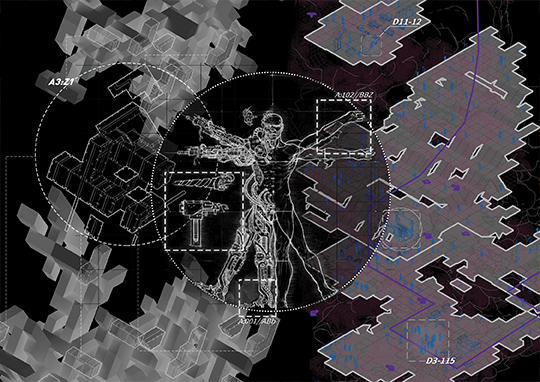Studio 18
Like-Humans
Darcy Zelenko and Danny Ngo

This studio is available to students enrolled in ABPL90142 Studio C, ABPL90143 Studio D, and ABPL90115 Studio E.
Studio Description
Architecture is both slow and beautifully ‘dumb’. This ‘slowness’ prohibits its ability to adopt new processes generated by a growing digital-physical environment. This is exacerbated by design communication and representations used in contemporary architecture. New technologies look to reframe these architectural mindsets and suggest alternative perspectives to ‘static’ buildings.
The construction industry has been one of the ‘slowest’ industries to adopt the digital epoch. Inversely, the architectural discipline has exponentially up-skilled its pursuit of innovation to seek better solutions in design. This discontinuity within the building environment and its lack of affiliation with the digital paradigm has led us to compute more while constructing less.
As complexity grows, the more diluted and specialized the architectural profession becomes, further detaching us from the ‘Master Builder’. Computational design and automation offer ways to achieve democratic workflows despite physical limitations. How can architects find ‘faster’ and ‘smarter’ ways of building and living?
Studio Outcomes
Like-Humans seeks to develop novel ways in which buildings can be designed and augmented to accept transplanted ‘parts’ much like human-prosthesis. This principle can be applied to buildings to re-use finite resources that would usually go to waste. From computation to digital fabrication to 3D scanning, current technological advances will be utilised and combined to facilitate this goal. Students of Like Humans will formulate a position in regards to the studio thesis and use it to drive the design of digital materials which can be transplanted amongst buildings. Design methodologies based on research and prototyping will be developed to inform top-down architectural speculations. A series of architectural design briefs will be assigned to students in order to test the reconfigurability of their digital materials. These will range in scale and scope from new dwellings to adapting larger scale building stock.
Studio Leaders
Darcy Zelenko works in Digital Fabrication as a consultant, researcher and educator. He specialises in bespoke timber and computational design. He uses these skills in industry and at the MSD Fab Lab where he’s employed as Lead Technician.
Danny is a graduate architect with a keen interest in material, novel construction, and computational applications. Danny’s explorations aim to leverage digital fabrication methods and look to improve inefficiencies in the built environment. He explores prototyping as part of architectural design and participates in exhibitions to test theories. Danny’s primary investigations aim to link design, technology, and construction and explore living standards to improve the quality of communities and urban conditions.
Readings & References
- Mario Carpo, The Second Digital Turn, Chapter 1 The second digital turn, The MIT Press, 2017
- Nicholas Negroponte, The Architecture Machine, Toward A More Human Environment, MIT Press, 1970
- Gilles Retsin, “Discrete and Digital: a discrete paradigm for design and production”, Texas Society of Architects, TxA conference (2016).
- Burry, Mark & Burry, Jane - Prototyping for Architects
Schedule Tuesdays 17:00-20:00, Fridays 17:00-20:00